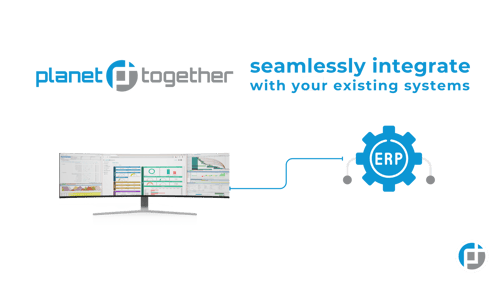Adaptive Scheduling in Medical Manufacturing: Meeting the Demands of Personalized Therapies
The era of mass production in medical manufacturing is evolving rapidly with the advent of personalized medicine. As therapies shift from standardized treatments to patient-specific solutions, the demand for flexibility in production scheduling has never been greater. For Production Schedulers in medical manufacturing, this evolution necessitates a fundamental transformation—from rigid planning cycles to dynamic, adaptive manufacturing systems.
In this landscape, tools like PlanetTogether Advanced Planning and Scheduling (APS) integrated with leading ERP platforms such as SAP, Oracle, Microsoft Dynamics, Kinaxis, or Aveva offer an indispensable advantage.
The Rise of Personalized Therapies: A New Production Paradigm
Personalized medicine is revolutionizing healthcare by tailoring treatments to individual patients based on genetic, environmental, and lifestyle factors. Therapies like CAR-T cell treatments, custom orthopedic implants, and 3D-printed biopharmaceuticals are no longer rare outliers—they are becoming the new standard.
For medical manufacturers, this transformation brings a wave of new challenges:
Shorter production runs
Higher product variability
Regulatory complexity
Increased demand for traceability
Tighter timelines
Traditional scheduling approaches are ill-equipped to manage these complex variables. Adaptive manufacturing is now the goal, but its success hinges on agile, integrated scheduling systems that can respond in real-time to production shifts and patient-specific customization.

Why Production Scheduling Needs to Be Adaptive
In personalized therapy environments, the margin for error is razor-thin. For Production Schedulers, this means dealing with frequent changes to batch sizes, machine configurations, and raw material requirements. The conventional “set-it-and-forget-it” approach to scheduling breaks down in such an environment.
An adaptive scheduling framework must provide:
Real-time visibility into machine, labor, and material availability
Scenario-based planning to simulate different outcomes
Rapid reallocation of resources in response to disruptions or new orders
Integrated quality control checkpoints for batch-level validation

The Role of PlanetTogether in Adaptive Scheduling
PlanetTogether APS plays a pivotal role in enabling adaptive manufacturing. When integrated with enterprise-level systems like SAP, Oracle, Microsoft Dynamics, Kinaxis, or Aveva, it becomes a central intelligence engine that harmonizes planning, scheduling, and execution. Here's how:
Dynamic Scheduling with Real-Time Adjustments
PlanetTogether uses finite capacity scheduling, allowing production teams to model machine, labor, and material constraints with exceptional accuracy. Personalized orders that deviate from the standard workflow can be rescheduled on the fly, minimizing bottlenecks.
Order-Level Granularity
For therapies that require patient-specific handling, PlanetTogether supports granular order tracking. Integration with SAP or Oracle ensures that each order carries metadata related to patient treatment protocols, expiration times, and approval workflows.
Seamless Integration with ERP Systems
By connecting PlanetTogether to platforms like Kinaxis or Microsoft Dynamics, manufacturers gain end-to-end visibility across supply chain, procurement, inventory, and production. Any change in demand planning instantly informs the scheduling module, ensuring no time is lost in translating strategy into action.
Enhanced Compliance and Audit Readiness
In regulated environments, compliance is non-negotiable. PlanetTogether’s scheduling engine captures detailed logs of every scheduling decision and resource assignment. When integrated with Aveva’s manufacturing execution systems, this enables full traceability and supports FDA 21 CFR Part 11 compliance.
Overcoming Key Challenges in Adaptive Manufacturing
While the benefits are clear, adaptive manufacturing isn’t without its hurdles. Production Schedulers often face:
Frequent Changeovers
High variability in production requires more changeovers, leading to downtime. PlanetTogether can minimize this by clustering similar jobs and sequencing them efficiently.
Limited Resource Pools
Personalized therapy manufacturing often involves specialized equipment and skilled technicians. With integrated resource management across ERP systems, PlanetTogether can preemptively flag resource shortages.
Complex Lead Time Calculations
Lead times vary drastically depending on customization. The system uses historical data and live updates to dynamically recalculate lead times, giving schedulers realistic delivery windows.
Best Practices for Implementation
For Production Schedulers preparing to adapt to this new paradigm, the following steps are essential:
Standardize Data Across Systems
Ensure your ERP, MES, and APS systems speak the same data language. Mismatches create delays and errors.
Prioritize High-Impact Integrations
Start with systems that manage BOMs, production orders, and quality assurance. SAP and Oracle are robust in these areas and integrate well with PlanetTogether.
Develop Cross-Functional Collaboration
Involve engineering, quality, and supply chain teams in scheduling decisions. Adaptive manufacturing thrives on interconnected insights.
Embrace Real-Time Dashboards
PlanetTogether’s dashboards can show live production progress, constraint violations, and critical alerts. These dashboards should be visible to shop floor supervisors and decision-makers alike.
Train Teams on Scenario Planning
Personalized manufacturing comes with uncertainty. Equip schedulers with the tools to run simulations and model different production outcomes before implementing changes.
Personalized therapies are not a passing trend—they represent a fundamental shift in how medical treatments are developed and delivered. Production Schedulers are at the center of this transformation. With adaptive scheduling powered by PlanetTogether APS and integrated into platforms like SAP, Oracle, Microsoft, Kinaxis, or Aveva, medical manufacturers can not only meet rising demand but do so with precision, agility, and regulatory confidence.
The road to personalized healthcare is paved with customized workflows, intelligent planning, and agile execution—and it starts in the scheduler’s office.
Are you ready to take your manufacturing operations to the next level? Contact us today to learn more about how PlanetTogether can help you achieve your goals and drive success in your industry.
Topics: PlanetTogether Software, Integrating PlanetTogether, Medical Manufacturing, Dynamic Scheduling with Real-Time Adjustments, Order-Level Granularity, Enhanced Compliance and Audit Readiness





















LEAVE A COMMENT